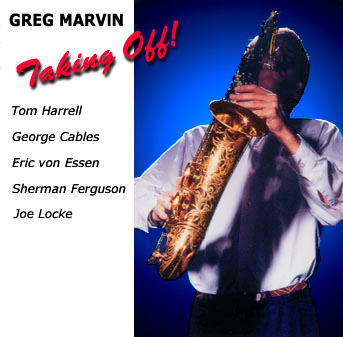GREG MARVINTAKING OFF!
Greg Marvin (ts); Tom Harrell (tp);
George Cables (p); Joe Locke (vbs);
Eric von Essen (b); Sherman Ferguson (d)
Van Gelder Studios, Engelwood Cliffs, NJ
November 24 and 27, 1989.
Recording Engineer: Rudy Van Gelder
When I first listened to this recording, I wasn’t sure that I wanted to review it because I wasn’t sure that I liked the way Greg Marvin plays the tenor saxophone. After spending some time with this, his fourth solo project, I can honestly say that I like his playing very much. I initially found it difficult to listen to Greg’s playing because he doesn’t sound like anyone else. He has achieved something that very few instumentalists ever achieve – he doesn’t sound like anyone else! Most tenor saxophonists I have heard during the past decade show very strong Coltrane and/or Michael Brecker influences. Greg Marvin has a very distinct sound and approach to playing the tenor saxophone that took me a little while to get used to. Now that I’m used to his playing I think it’s great.
One thing that’s very unique about his playing is the lack of articulation. He slurs long passages of eighth-notes throughout his solos which in and by itself sets his playing apart from most other saxophonists. This lack of articulation gives his playing a very unique style that probably wouldn’t work for many saxophonists, but he is able to use this practice in a very musical way.
Greg has studied with Lenny Tristano and Warne Marsh and their influences can be heard in his playing. In the liner notes of this CD, Greg claims to have been influenced most by Lester Young, Sonny Rollins, Warne Marsh, and Charlie Parker.
An important ingredient to the personality of this recording is the chemistry that happens between Marvin and flugelhornist Tom Harrell. Tom can be heard playing trumpet and flugelhorn on many recordings made during the past ten years.He is an incredibly gifted improvisor and has incredible technique on his instrument.
All but one of the tunes on this recording were written by Greg Marvin. The first selecion, 7 West has a simple melody but a very interesting chord progression devised by Greg. Under Saturn is a pretty ballad based on a 24-bar structure. Taking Off! is based on the changes to All The Things You Are. Nightlife is a burning up-tempo piece that shows Greg’s tremendous technique. The tune is based on You Stepped Out of a Dream with Greg’s reworking of the bridge section. Love Song is based on Embraceable You and shows Greg playing in a very lyrical, introspective style. His gorgeous tone adds to the beauty of this selection. Devil’s Dream is another up-tempo piece. It’s based on the changes to I’ll Remember April and features burning solos by Greg, Joe Locke on vibes, and Harrell. My Old Flame, by Coslow- Jonston, is the only selection on this recording that wasn’t written by Greg Marvin. The head of the tune gets a very interesting treatment from Greg and Tom Harrell playing bits and pieces of the melody in a counterpoint style. The same treatment is applied on the end of the tune. Last Call is based on the changes to Just Friends and provides a very enthusiastic ending to a thoroughly stimulating recording. I recommend that you check out the playing of Greg Marvin.
Paul Evoskevich
Saxophone Journal
LINER NOTES
Greg Marvin is an authentic original. Eschewing the trappings of trendy au courant stylistic fads and fancies, the young 33 year old New York tenor man has forged a compelling personal approach that continues to both deepen and expand.
Greg, in contrast to the majority of his contemporary sound–alikes who seem caught somewhere between the gravitational pulls of John Coltrane and Michael Brecker, has evolved a personal tone that is as recognizable as the ‘signature sounds’ of such contemporary legends as Sonny Rollins, Stan Getz, Dexter Gordon or the aforementioned Coltrane and Brecker.
Along with his singular sound, Greg possesses an improvisational style that constantly surprises. Indeed, in spite of having been labeled a Lennie Tristano or Warne Marsh disciple, Greg’s idiosyncratic improvisations actually defy categorization, easy or otherwise. Greg, at least to my ears, has assimilated and reconfigured primal elements from an array of potent sources. There is a burr in his sound, for example, suggesting Sonny Rollins. There are tornadic flurries evocative of Coltrane. Also, there is concern for the dramatic power of the pause reminiscent of Konitz. His audaciously wide intervallic leaps, for me, recall the mercurial trumpeting of Woody Shaw. And, yes, there are the dense linear convolutions that, indeed, remind one of Tristano and Marsh.
The lumping of Greg with Tristano and Marsh has been made, I think, because Greg has studied with Lennie and Warne, a fact that has blinkered too many “critics” who have “listened” with their eyes instead of their ears. Greg, quite understandably, is sensitive to having been unfairly typecast. And while expressing deep appreciation to Tristano and Marsh, he clarified the issue for me by noting that “Studying with Lennie didn’t involve anything esoteric. In fact, we concentrated on the classic Jazz tradition. It was about Lester Young and Charlie Parker.” Ironically, Greg was first drawn to Jazz at the age of 17 because of, as he puts it, “a few magic records by John Coltrane, Live at the village Vanguard, Live at Birdland and Africa Brass. I had been playing guitar since the age of nine, but after hearing Coltrane, I got my hands on a saxophone. Then I got interested in Sonny Rollins. And all of that was before I had met Lennie. As for influences, the big three as far as tenors go are Lester young, Sonny Rollins and Warne Marsh. Of course, there’s always Bird.”
Greg first became aware of Marsh through records. “Later after Lennie’s death, I met Warne when he was working in New York. I can tell you that more than anyone else, hearing Warne made me want to play, and really, it was because of him that I eventually committed to music. Warne was a brilliant musician and a beautiful artist. I was lucky to have known him.”
It might seem from the foregoing, that the young Mr. Marvin is a solemn and introspective individual. While he certainly has a serious side and is gifted with an incisive intellect, Greg also possesses a warmth and ready wit that are reflected in his conversation as well as in his playing. When I asked him what this album represents for him, he responded in quip–like fashion, “Aside from going broke?”
As our laughter subsided, Greg commented that this was also an opportunity “to document some material that I’ve been working on for some time. It’s a part of a process that, in a way, allows me to go on to take another step. So the entire recording process is a tremendous means of mapping and encouraging growth.” Taking Off, speaking of charting growth, is Greg Marvin’s fourth solo project, and a logical follow–up the critically acclaimed The Greg Marvin Quartet (HI-Hat 1986), I’ll Get By (HI-Hat 1987), and Workout! (Criss Cross 1988). If one can be judged by the company one keeps, then these previous efforts tell us much about the Olympian goals set by Greg, for his colleagues included the estimable talents of pianists Hank Jones, Kenny Barron and Susan Chen, bassist George Mraz, drummers Billy Higgins, Mel Lewis, Akira Tana and Kenny Washington, and trumpeter/flugelhornist Tom Harrell. The roster for Taking Off! is no less impressive.
Indeed, the key ingredient in Taking Off!’s extraordinary chemistry is Greg’s synergetic relationship with the equally gifted Tom Harrell, heard here exclusively on flugelhorn. “We met two or three years ago.” Greg recalls, “when I was putting Workout! together. I knew as soon as we started playing that it was going to click. We had a lot of written material on that project and did quite a bit of rehearsing together. In the process we became good friends. He’s both encouraged and inspired me every time we’ve met; I don’t know what more another mortal can do for you than that.” Greg obviously knows what Phil Woods and just about every other serious player knows, for Tom Harrell is one of today’s most sought after players; conversely, it’s also apparent that Tom has the highest regard for Greg’s highly personal and adventurous style.
“George Cables has been one of my most favorite pianists for a long, long time,” Greg exclaimed about San Francisco’s pianistic pride and joy. “I first heard him live with Art Pepper in the mid-to late 1970’s. He’s a very direct and emotional player. And he has a very ‘up‘ kind of feeling. I had never actually met him until the rehearsal. But again everything clicked. At the end of the rehearsal, I wanted to shake his hand and he just hugged me. That’s what playing is about. I loved working with George.” That kind of mutual respect and simpatico, I should add, is palpably present in every digitized informational frame of the disc.
Drummer Sherman Ferguson is another west coast stalwart, a denizen of the City of angels whose subtle propulsiveness has ignited many a session with such all–stars as Benny Carter and Kenny Burrell. “I first heard Sherman on one of Warne’s last dates. He’s a great, great drummer and was perfect for this date. He’s very adventurous but also very precise. I really enjoyed this rhythm section. It didn’t matter if I was playing just a bit behind or ahead of the beat. They kept everything in the same place so I could come back. It was an incredible feeling of freedom, and great support.”
Eric von Essen, also from Los Angeles, has rapidly established himself as one of L.A.’s finest young bassists through associations with Art Farmer, Frank Morgan, Bob Brookmeyer, Don Menza and Jimmy Rowles. “Richie Beirach introduced me to Eric several years ago at Bradley’s. We became good friends, exchanged tapes, and got together whenever I was in Los Angeles or he was in New York. And though we hadn’t had a chance to play until several weeks before the date, I knew it was going to work. He’s a great guy, a great bassist, and just played beautifully. I especially appreciated his enthusiasm for this project.”
Greg also “wanted the additional color of the vibraphone for this date,” a dimension neatly supplied by vibist Joe Locke, a New Yorker who’s recorded with Kenny Barron and Eddie Gomez. “I wanted a third voice for some of the compositions I had been working on. I think Joe plays particularly well on 7 West.
Marvin’s repertory of originals is another significant facet of the young tenorist’s musical persona. And like his playing, Greg’s compositional compass continues to broaden. The provocative yet nicely balanced roster of tunes also includes a venerable evergreen, My Old Flame. First up is 7 West, an ingeniously devised harmonic twister which Greg notes has “a chord progression of my own as opposed to being a reharmonization of a standard. And, I wanted to write something with a fairly simple melody, something that could be sung. The title, by the way, is Tommy’s address in New York, where we first played it.”
A showcase for Greg’s pungent balladry is the harmonically off–beat Under Saturn, a 24–bar structure with a written melody stretched over the first 12–bar section. Here, Greg’s rich, resonant tenor suggests the push–pull rhythmic elasticity that one finds in the supple ballad playing of Sonny Rollins and Dexter Gordon. “It’s a pretty unusual progression. It doesn’t telegraph it’s punches, so you just have to learn it.”
Taking Off!, though based on the indelible changes of Jerome Kern’s All the Things You Are, is a perfect example of how Greg’s unique approach both springs out of and yet deviates from that of Tristano and Marsh. As for similarities, the medium paced Taking Off! is an adroitly choreographed ensemble improvisation. But in contrast to much of Tristano’s work, Greg lets his rhythm section cut loose so that the band swings with congenial abandon. There are also specifically mapped sections for inspired dialogues between bass and drums, as well as tenor and trumpet. And, there’s a nifty tour for George Cables ebullient piano. “I wanted to see what kind of performance we could build up in a more relaxed setting where everyone knew the changes and the music could be more conversational.” There is, indeed a literal ‘taking off’ as the group individually and collectively, takes flight.
Nightlife provides a fine example of Greg’s smoldering up–tempo playing. The chordal spine is borrowed from You Stepped Out of a Dream. Note, however, Greg’s poignant reharmonization of the mid–section. “This and Taking Off! are first takes and, I think, my favorite performances from the date. After the last record with its intricate lines that required some intense rehearsals, I wanted to do something that was freer and more spontaneous. All these guys can read great, but I wanted to avoid the tedium of rehearsals and the added nervousness in the studio that goes with more complex written material.” Among the highlights are the tag–team tandems where Tom’s brightly burnished flugelhorn and Greg’s fleet tenor weave acrobatic arabesques.
Another gem is Love Song which spotlights, along with Greg’s heart–on–sleeve tenoring, the implosive soloing of bassist Eric von Essen. “This one is based on ‘Embraceable You‘, a song I’ve been playing for a long time now, I suppose because of those beautiful Charlie Parker takes with Miles and Duke Jordan.”
The upbeat Devil’s Dream, which Greg first recorded with Hank Jones on I’ll Get By, is a whirling dervish laid out over the harmonic markers of I’ll Remember April. “The only composed material is the first 8 bars, where I used three voices with Joe’s vibes on top, Tommy’s flugelhorn in the middle and the tenor with the original melody on the bottom. The nice thing about having a chord progression like ‘April’ is that it’s familiar to a lot of people, which helps them connect with the improvisations”. It’s a cooker from beginning to end with galvanizing solo work from all hands including the shimmering vibes of Joe Locke.
The Coslow–Johnson chestnut, My old Flame, gets tender loving care from Greg, Tom, George and Eric. Sherman Ferguson’s superb brush work should also be noted. Indeed, Fergusons insinuating rhythmic flows epitomize the art of tasteful percussive support throughout the album. Here, Greg comes up with another effective approach for varying the format. “I take the first phrase of the melody, then Tommy takes the second. But that’s the extent of the original melody that we use.”
The curtain closer is a rousing flag–waver aptly entitled Last Call. Combining a melodic fragment from I’ll Get By with the changes of Just Friends, it’s a springboard for a set of enthusiastic dialogues between all participants, who at the end of this impressive date were obviously more than ‘just friends’. In wrapping up our conversation about the album, Greg took the time to emphatically thank Peter Leitch, the superb guitarist who produced the session. “Peter was of tremendous help in bringing everyone and everything together. His suggestions, even in selecting takes, were great. He was with us at the rehearsal, as well as at the studio. He’s been a good friend throughout.”
The fitting title for the album, Taking Off!, while alluding to Greg’s already outstanding level of accomplishment, is, I am confident, an harbinger for even bigger and better things. His distinctive “voice”, with its inspired and individual vocabulary, promises to become even more commanding. And as we seek refuge from the derivative din of the noisier manifestations of mass–produced popular culture, it is the Greg Marvin’s of the world from whom we’ll seek ‘the real thing’. Quite simply, Greg Marvin is an artist.
Dr. Chuck Berg
The University of Kansas
Jazz Times, Jazz Educators Journal,
Downbeat, The Lawrence Journal-World
The Good CD Guide to Jazz on Compact Disc
“He has achieved something that very few instrumentalists ever achieve – he doesn’t sound like anyone else!”
– Saxophone Journal
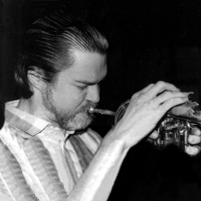
Tom Harrell: Flugelhorn
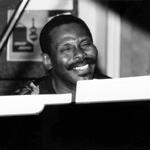
George Cables: Piano
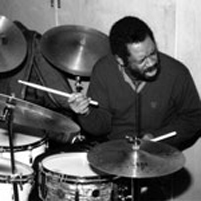
Sherman Ferguson: Drums
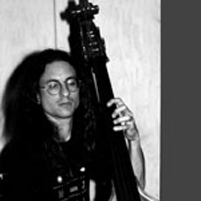
Eric von Essen: Bass
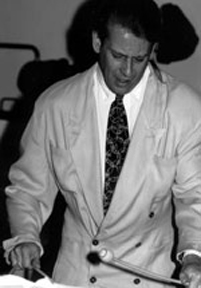
Joe Locke: Vibes
